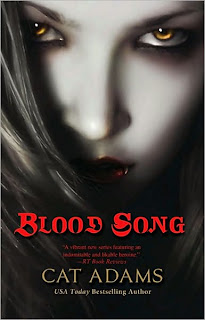 Everybody knows that, in any field of creative endeavor, if you want to be taken seriously you have to go Dark. Sure, the audiences always prefer the fluffy stuff -- the stories with happy endings, adventurous settings, and danger in measured amounts -- but the critics reserve their best praises for the stories of hopelessness and pain, the ones where everything is going to go to hell no matter what anyone does. So every creative person goes Dark at least once -- hell, even fantasy's resident lord of the bad pun, Piers Anthony, dug up that singularly unpleasant story "In the Barn" thirty-some years ago, as if knowing he'd be needed as a horrible example eventually.
Everybody knows that, in any field of creative endeavor, if you want to be taken seriously you have to go Dark. Sure, the audiences always prefer the fluffy stuff -- the stories with happy endings, adventurous settings, and danger in measured amounts -- but the critics reserve their best praises for the stories of hopelessness and pain, the ones where everything is going to go to hell no matter what anyone does. So every creative person goes Dark at least once -- hell, even fantasy's resident lord of the bad pun, Piers Anthony, dug up that singularly unpleasant story "In the Barn" thirty-some years ago, as if knowing he'd be needed as a horrible example eventually.The God Engines is John Scalzi -- SF's current master of the optimistic, can-do spirit, Hugo and Campbell Award winner, and relentless blogger -- Going Dark. And it's very, very Dark indeed.
God Engines is either fantasy in light SFnal dress or a story with essentially SFnal underpinnings that are never explained in those terms -- each reader can choose which way to consider it, depending on which stories she likes best. (I've seen too many people say about border cases, "This is fantasy, and I know that because I hate fantasy!" to be dogmatic on either side.) It's set in a starfaring civilization that could be in our distant future but doesn't need to be -- there are many planets inhabited by human beings, and, as far as we see, no other similar sapient races around.
There is, or was, a superior sapient race, or group, though -- the gods. Scalzi never stops to explain all of the details -- this is a novella, and telling the story is more important than detailed backstory [1] -- but there were once, thousands of years ago, a lot of gods of around the same, limited power level, and now there is one god with a large empire, a few scattered smaller gods outside that empire (fighting with each other and the Big God), and a number of captured gods bound into the service of the Big God. (Scalzi never names any of the gods -- the one that rules the empire is referred to as "our lord" by his human worshippers, and of course he intends the echo of current usage there.)
The captured gods serve as power supplies for "our lord's" starships, where they are bound and controlled but not always cowed. The particular god of most importance in God Engines is the one powering the starship Righteous, commanded by Captain Ean Tephe. (He has a name, or once had one, but it's the usual too-long-to-pronounce alien name, and it's alluded to but never enters the narrative.) The god engine of the Righteous has not lost all hope; he still schemes and rebels and has fugitive worshippers, out in the empire. (The gods, in Scalzi's conception, follow the usual scientific-fantasy model: each individual worshipper gives a god a certain quantum of power, thus the gods with the most worshippers have the most power. Scalzi adds some further details about the quality of those worshippers, but it's still essentially a numbers game.)
Captain Tephe has to keep his god engine running, and to do the usual job of a captain -- work around his drunken and broken
But then, as often happens in a story like this, Tephe learns that things are worse that he knew, and is chosen for a dangerous mission. Things get worse from there, of course -- Scalzi is going Full Dark here, pulling out all the stops to show that he can be as bleak and depressing as anyone -- and the story ends as a Dark story must. Tephe is the center of God Engines, and his actions do motivate most of its plot, but he's almost entirely an agent of greater powers, lied to and manipulated and jerked around by beings that even he calls gods. He's not precisely on rails during the course of The God Engines -- he could have done things differently that changed the outcome -- but, to continue the video-game metaphor, those changes would likely only have led to nasty alternative deaths.
Given Scalzi's clearly stated antipathy to authoritarian organized religion, one could easily work up a allegorical reading of God Engines -- but it strikes me as more of a traditional SF thought experiment (what if starships used gods for power?), so I think a reading of that kind would be a mistake. In the end, God Engines doesn't have any clear moral, other than, perhaps "sucks to be you." Or maybe "stay far away when gods are fighting." It's a short and well-told story, but it does have the airless nastiness of so many "serious" SF novellas of the past couple of decades, which makes it less enjoyable than most of Scalzi's fiction. I hope he's gotten Dark out of his system now -- at least for a while.
[1] I can think of half-a-dozen writers who should have this phrase tattooed on the inside of their eyeballs.
Book-A-Day 2010: The Epic Index
----------------
Listening to: Jaymay - One May Die So Lonely
via FoxyTunes























